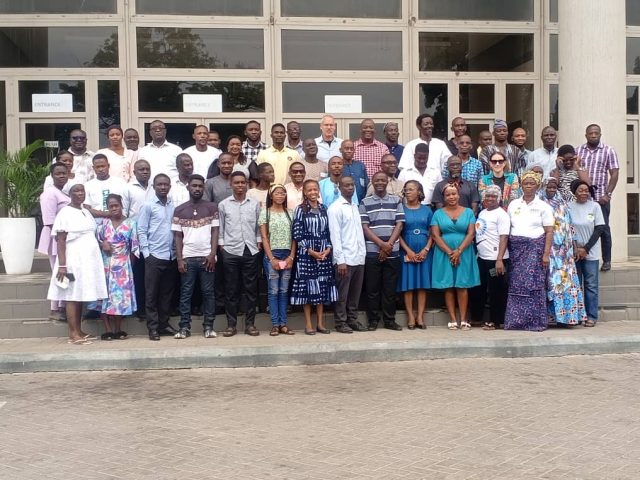Community members from Chorkor, Old Fadama, and Agbogbloshie have presented detailed risk assessment reports to the Accra Metropolitan Assembly (AMA) and its stakeholders, urging that their data be incorporated into the city’s disaster risk reduction and urban development planning.
The assessments, conducted under the Resilience Initiative Africa (RIA) project implemented by GIZ (Deutsche Gesellschaft für Internationale Zusammenarbeit), reveal that residents in the three informal settlements face high levels of vulnerability to floods, fires, poor sanitation, and weak infrastructure, particularly affecting women, children, and persons with disabilities.
Speaking at a stakeholder engagement workshop in Accra, Sophia Kumau, GIZ’s RIA project officer, explained that the initiative aims to build resilience in vulnerable communities by equipping them with tools to collect and interpret their own risk data. “This is not just about data collection—it’s about giving communities the voice and technical capacity to influence city-level decisions on disaster preparedness and planning,” she noted.
The project, titled “Know Your City Risks”, is jointly implemented in Ghana and Tanzania. It seeks to strengthen the capacity of organized informal settlements to capture risk information and co-develop inclusive and locally relevant disaster management solutions.
In Ghana, the initiative is led by People’s Dialogue on Human Settlements in partnership with the Ghana Federation of the Urban Poor (GHAFUP). These partners worked closely with community members to develop data collection tools and facilitate peer learning on risk assessment. The three Accra-based communities were selected based on their exposure to recurrent urban risks and their level of community organization under the Ghana Alliance.
Presenting the findings on behalf of his peers, Alhassan Baba Fuseini, a community leader, highlighted major risk factors including: Frequent flooding due to clogged drains and poor waste disposal systems, risk of fire outbreaks in densely built wooden structures, especially in Old Fadama and Agbogbloshie.
Other risk factors include inadequate access to potable water and sanitation services, and high exposure of children and PWDs to health hazards.
Touching on the findings, Salifu Abdella , a Programs Officer with the People’s Dialogue, noted that the communities are now aware of the risk their environment is exposed to, and this calls urgent actions from the city authority.
“women and children are the most affected when disaster strikes,” he added. This data gives us a seat at the table.”
In response, Richard Oduro, the Metropolitan Planning Officer, presented the Accra City Disaster Risk Plan, noting that the community assessments align with many of the city’s findings and will be instrumental in shaping the next phase of urban resilience strategies.
“We are reviewing our disaster risk management framework, and the insights from these communities will feed into that process,” he said. “Our goal is to ensure that Accra’s urban planning is inclusive, data-driven, and responsive to those most at risk.”
With over 21,000 members across more than 30 urban municipalities, People’s Dialogue and GHAFUP form the Ghana Alliance, a grassroots network advocating for incremental slum upgrading, improved infrastructure, and inclusive development policies.
Through the RIA project, they aim to demonstrate that locally-led, gender-responsive, and risk-informed urban planning is not only possible but necessary for sustainable development in African cities.
Send your news stories to newsghana101@gmail.com
Follow News Ghana on Google News















